我是靠谱客的博主 隐形橘子,这篇文章主要介绍Qt:26---QStandardItemModel数据模型一、QStandardItemModel类的基本功能二、QItemSelectionModel类三、QModelIndex、QModelIndexList类四、常用函数五、演示案例,现在分享给大家,希望可以做个参考。
一、QStandardItemModel类的基本功能
- QStandardItemModel是标准的以项数据为基础的标准数据模型类
- QStandardItemModel通常与QTableView组合成数据模型,实现通用的二维数据的管理功能
- QStandardItemModel维护一个二维的项数据数组,每个项是一个QStandarItem类对象,用于存储项的数据、字体格式、对齐方式等
二、QItemSelectionModel类
- 概念:一个用于跟踪视图组件的单元格选择状态的类。QTableView与QStandardItemModel数据模型组合后,在QTableView选择某个/多个单元格后,这些单元格就组合成一个QItemSelectionModel类对象
- 是一个选择模型
三、QModelIndex、QModelIndexList类
- QModelIndex:获得当前数据模型的索引,通过QModelIndex QStandardItemModel::index(int row, int column, const QModelIndex &parent = QModelIndex()) const、QModelIndex QItemSelectionModel::currentIndex() const函数获取,或者QModelIndexList的at函数获取
- QModelIndexList:获得当前数据模型的索引集合,通过QModelIndexList QItemSelectionModel::selectedIndexes() const函数获得
四、常用函数
//通过数据模型索引获得QStandardItem 对象
QStandardItem *QStandardItemModel::itemFromIndex(const QModelIndex &index) const
//为QStandardItemModel数据模型设置表头
void QStandardItemModel::setHorizontalHeaderLabels(const QStringList &labels)
//为QStandardItemModel数据模型的指定行、列设置QStandardItem对象
void QStandardItemModel::setItem(int row, int column, QStandardItem *item)
//将QStandardItem对象设置为CheckBox状态(选中/未选中)
void QStandardItem::setCheckState(Qt::CheckState state)
//获取表头数据
QVariant QStandardItemModel::headerData(int section, Qt::Orientation orientation, int role = Qt::DisplayRole) const
//在row行之前插入一个QList集合的对象
void QStandardItemModel::insertRow(int row, const QList<QStandardItem *> &items)五、演示案例
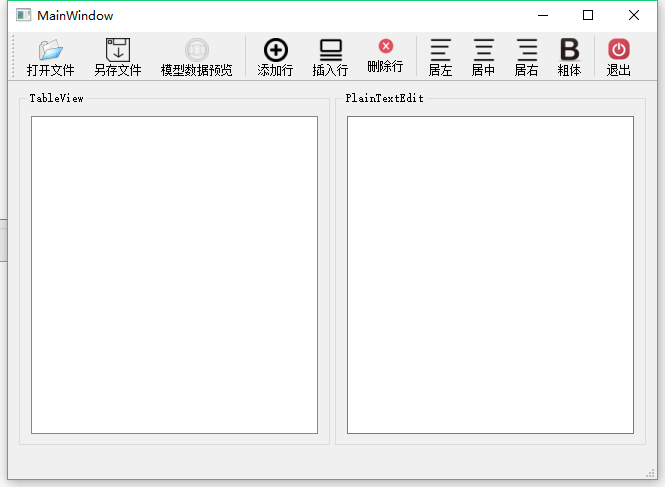
功能实现
工具栏使用到的Action
类的定义
- 类中的初始化变量、函数、宏定义
类构造函数
on_currentChanged槽函数
//鼠标选中tabView单元格变化时,在状态栏显示行、列号,内容等信息 void MainWindow::on_currentChanged(const QModelIndex ¤t,const QModelIndex &previous) { if(current.isValid()) { LabCellPos->setText(QString::asprintf("current:%d row,%d col",current.row(),current.column())); QStandardItem* aItem=theModel->itemFromIndex(current);//获得当前项对象 this->LabCellText->setText("Current content:"+aItem->text());//获得当前项的内容,并显示 QFont font=aItem->font(); ui->actFontBold->setChecked(font.bold()); } }
文件打开triggered函数、与自定义函数iniModelFromStringList
- 文件打开triggered的函数会打开一个已经书写规范的文件,然后读取这些文件的数据,存放在一个QStringList对象中,然后将QStringList对象作为iniModelFromStringList函数的参数调用该函数,然后iniModelFromStringList将这些数据显示到tabView中
- 最后一列“测井取样”为布尔值,在设置tabView时,我们将最后一列设置为CheckBox对象
- QString::split()函数用来分割成一个QString对象分割为QStringList对象
void MainWindow::on_actOpen_triggered() { QString curPath=QCoreApplication::applicationDirPath();//获得当前路径 //打开一个文件 QString aFileName=QFileDialog::getOpenFileName(this, QStringLiteral("打开一个文件"),curPath,QStringLiteral("井数据文件(*.txt);;所有文件(*.*)")); if(aFileName.isEmpty()) return; QStringList fFileContent; QFile aFile(aFileName);//将打开的文件创建一个QFile对象 if(aFile.open(QIODevice::ReadOnly|QIODevice::Text))//以文本、只读的方式读取文件 { QTextStream aStream(&aFile); ui->plainTextEdit->clear(); while(!aStream.atEnd())//循环读取文件 { QString str=aStream.readLine();//读取一行数据 ui->plainTextEdit->appendPlainText(str); fFileContent.append(str);//将读取到的数据添加到QStringList对象中 } aFile.close(); this->LabCurFile->setText(QStringLiteral("当前文件:")+aFileName); iniModelFromStringList(fFileContent); } } void MainWindow::iniModelFromStringList(QStringList &aFileContent) { int rowCnt=aFileContent.count();//获取文本的行数 theModel->setRowCount(rowCnt-1); //设置表头,一个或多个空格、TAB等分隔符隔开的字符串,分解为一个StringList QString header=aFileContent.at(0);//获取第一行数据,将数据作为tabView的表头 QStringList headerList=header.split(QRegExp("\s+"),QString::SkipEmptyParts);//调用split函数分割数据 theModel->setHorizontalHeaderLabels(headerList);//将分割好的QStringList作为QStandardItemModel模型的表头数据 //设置表格数据 QStandardItem* aItem;//每一个项 QStringList tmpList; int j; for(int i=1;i<rowCnt;++i)//循环遍历行 { //获取行数据,然后进行分割 QString aLineText=aFileContent.at(i); tmpList=aLineText.split(QRegExp("\s+"),QString::SkipEmptyParts); for(j=0;j<FixedColumnCount-1;j++)//循环改行数据,并将每一项作为列数据 { //不包含最后一列 aItem=new QStandardItem(tmpList.at(j)); theModel->setItem(i-1,j,aItem); } //最后一列 aItem=new QStandardItem(headerList.at(j)); aItem->setCheckable(true);//先将最后一列设置为选中 if(tmpList.at(j)=="0")//如果最后一列为0,则设置为未选中 aItem->setCheckState(Qt::Unchecked); else//如果最后一列为1,则设置为选中 aItem->setCheckState(Qt::Checked); theModel->setItem(i-1,j,aItem);//设置最后一列 } }
添加行按钮触发函数(act_Append_triggered)
- void QStandardItemModel::insertRow(int row, const QList<QStandardItem *> &items) //该函数在row行之前插入一行数据,数据为参数2QList的集合
- void QStandardItemModel::insertRow(int row, QStandardItem *item) //该函数在row行之前插入一个QStandardItem对象
void MainWindow::on_actAppend_triggered() { QList<QStandardItem*> aItemList;//一个集合,用来保存QStandardItem项 QStandardItem *aItem; //循环列数,只循环前5列,并且创建QStandardItem对象存放在QList集合中 for(int i=0;i<FixedColumnCount-1;++i) { aItem=new QStandardItem("0");//每一个项的内容初始化为0 aItemList<<aItem; } //因为最后一列为CheckBox,所以特殊处理 //获得最后一列的标头标题 QString str=theModel->headerData(theModel->columnCount()-1,Qt::Horizontal, Qt::DisplayRole).toString(); aItem=new QStandardItem(str);//将标头标题设置为最后一列的内容 aItem->setCheckable(true);//最后一列设置为选择状态 aItemList<<aItem; //在rowCount()行之前插入一行数据,aItemList为插入的集合 theModel->insertRow(theModel->rowCount(),aItemList); //获得一行的索引 QModelIndex curIndex=theModel->index(theModel->rowCount()-1,0); theSelection->clearSelection();//清除选择模型 //将当前的选择对象设置为最后一行 theSelection->setCurrentIndex(curIndex,QItemSelectionModel::Select); }
插入行按钮触发函数(actInsert_triggered)
- 与添加行按钮的代码类似,只是将insertRow的参数1改为当前选择的索引即可,就是在当前的索引处插入一行新数据
删除行按钮触发函数(actDelete_triggered)
- bool QAbstractItemModel::removeRow(int row, const QModelIndex &parent = QModelIndex()) //删除指定的行
- 下面的代码为什么要判断是否为最后一行,因为QStandardItemModel数据模型刚打开的时候是没有处于选择状态的
void MainWindow::on_actDelete_triggered() { QModelIndex curIndex=theSelection->currentIndex();//获取当前的模型索引 if(curIndex.row()==theModel->rowCount()-1)//如果选择的索引为最后一行 theModel->removeRow(curIndex.row());//删除最后一行 else//如果选择的不是最后一行 { theModel->removeRow(curIndex.row());//删除改行 //重新设置模型索引 theSelection->setCurrentIndex(curIndex,QItemSelectionModel::Select); } }
居左、居中、居右按钮触发函数(actAlignLeft_triggered)
- setTextAlignment() //用来这是QStandardItem对象的对齐方式
- 下面只演示向左对齐的,居中与向右对齐只需要改变setTextAlignment函数的参数即可
void MainWindow::on_actAlignLeft_triggered() { if(!theSelection->hasSelection())//如果当前没有选中单元格,直接退出 return; //获取选中的单元格索引列表,存放在QModelIndexList对象中 QModelIndexList selectIndex=theSelection->selectedIndexes(); for(int i=0;i<selectIndex.count();++i)//遍历QModelIndexList对象 { QModelIndex aIndex=selectIndex.at(i);//获取模型索引 QStandardItem* aItem=theModel->itemFromIndex(aIndex);//根据模型索引获得QStandardItem对象 aItem->setTextAlignment(Qt::AlignLeft);//设置该对象文字向左对齐 } }
粗体按钮触发函数(actFontBold_triggered)
- void QStandardItem::setFont(const QFont &font) //设置项的字体格式
void MainWindow::on_actFontBold_triggered() { if(!theSelection->hasSelection())//如果当前没有选中单元格,直接退出 return; //获取 选中选中的单元格索引列表,存放在QModelIndexList对象中 QModelIndexList selectIndex=theSelection->selectedIndexes(); for(int i=0;i<selectIndex.count();++i)//遍历QModelIndexList对象 { QModelIndex aIndex=selectIndex.at(i);//获取模型索引 QStandardItem* aItem=theModel->itemFromIndex(aIndex);//根据模型索引获得QStandardItem对象 QFont font=aItem->font();//获得字体对象 font.setBold(true);//将字体为粗体 aItem->setFont(font);//为该项设置字体对象 } }
另存文件按钮触发函数(actSave_triggered)
- 点击该按钮,可以将数据模型的数据另存为一个数据文本文件,同时也显示在PlainTextEdit里
- 注意:该函数还有问题,待解决
void MainWindow::on_actSave_triggered() { QString curPath=QCoreApplication::applicationDirPath();//获得当前路径 QString aFileName=QFileDialog::getSaveFileName(this,QStringLiteral("选择一个文件"), curPath,QStringLiteral("井斜数据文件(*.txt);;所有文件(*.*)"));//设置一个保存文件 if(aFileName.isEmpty()) return; QFile aFile(aFileName);//为保存文件设置QFile对象 if(!(aFile.open(QIODevice::ReadWrite|QIODevice::Text|QIODevice::Truncate))) return; QTextStream aStream(&aFile);//为保存文件设置文件流对象 QStandardItem* aItem; int i,j; QString str;//创建一个QString对象,用来保存 ui->plainTextEdit->clear(); for(int i=0;i>theModel->columnCount();++i)//遍历列数 { aItem=theModel->horizontalHeaderItem(i);//先将表头数据保存到QString中 str=str+aItem->text()+"t"; } aStream<<str<<"n";//换行 ui->plainTextEdit->appendPlainText(str); for(i=0;i<theModel->rowCount();++i)//遍历行数 { str=""; for(j=0;i<theModel->columnCount()-1;j++)//遍历列数,不包括最后一列 { aItem=theModel->item(i,j); str=str+aItem->text()+QString::asprintf("t"); } //最后一列特殊处理 aItem=theModel->item(i,j); if(aItem->checkState()==Qt::Checked) str=str+"1"; else str=str+"0"; ui->plainTextEdit->appendPlainText(str); aStream<<str<<"n"; } }
数据模型预览按钮触发函数
- 与数据另存为文件按钮的功能类似,就是将数据模型的数据显示到右侧的PlainTextEdit里面
最后
以上就是隐形橘子最近收集整理的关于Qt:26---QStandardItemModel数据模型一、QStandardItemModel类的基本功能二、QItemSelectionModel类三、QModelIndex、QModelIndexList类四、常用函数五、演示案例的全部内容,更多相关Qt:26---QStandardItemModel数据模型一、QStandardItemModel类内容请搜索靠谱客的其他文章。
本图文内容来源于网友提供,作为学习参考使用,或来自网络收集整理,版权属于原作者所有。
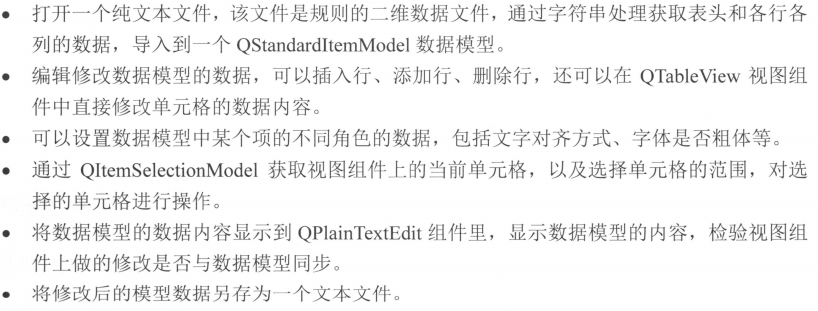
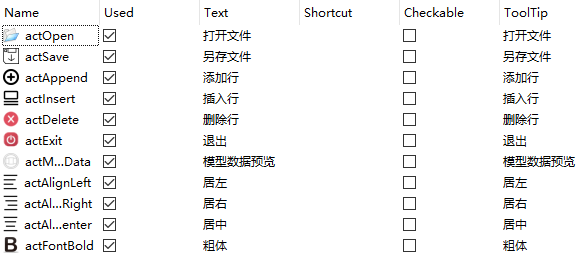
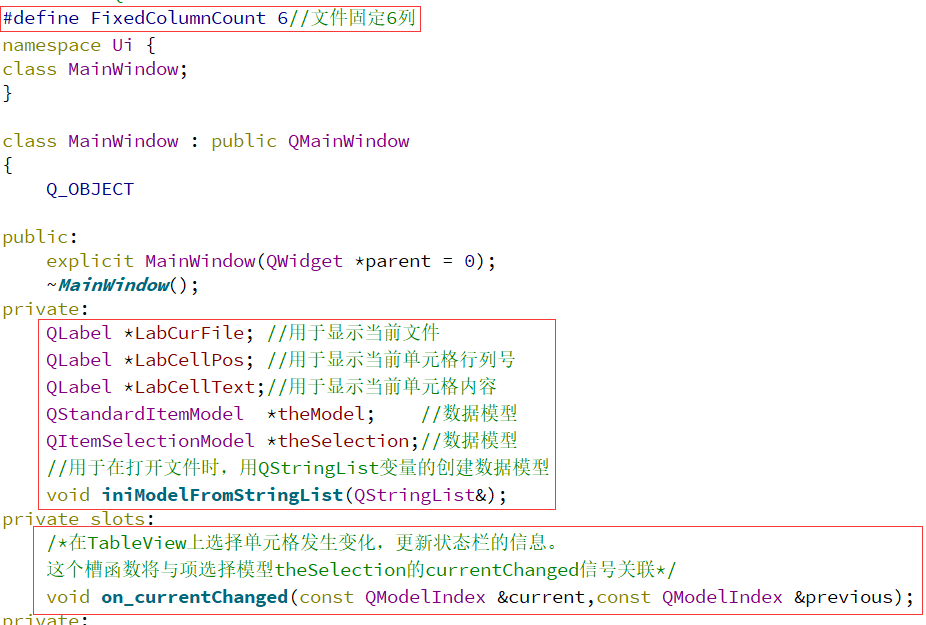
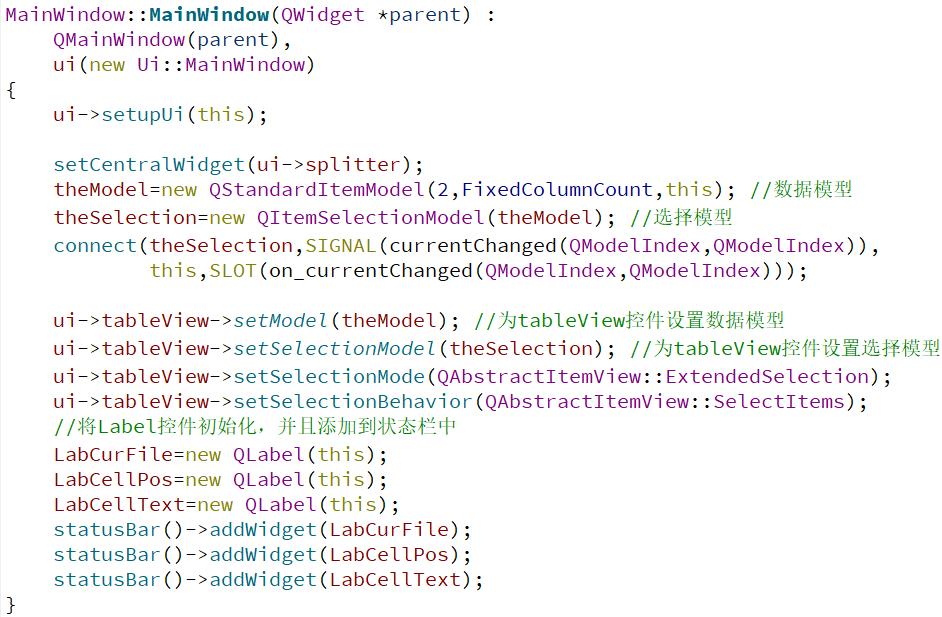
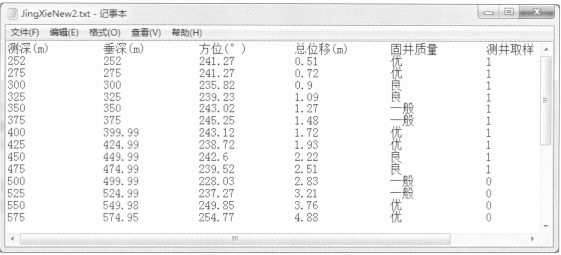
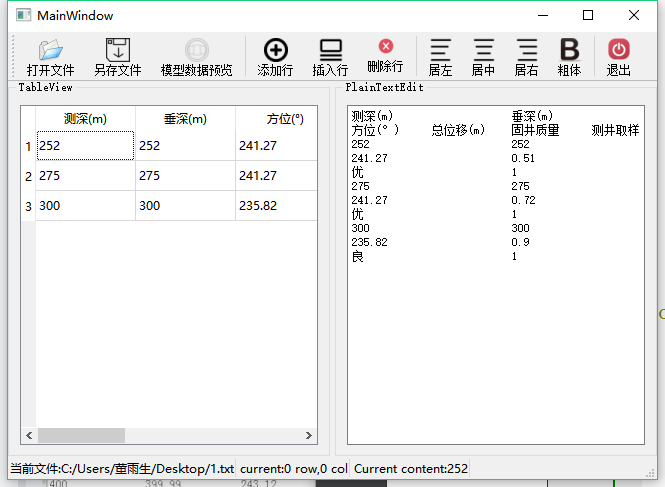
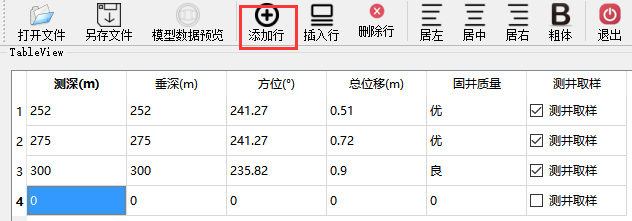








发表评论 取消回复